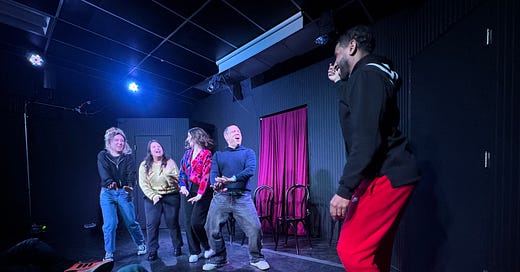Teaching Game 3: Open Scenes
Let’s talk about notes you can give when people are working on game in “open scenes.”
(The usual qualifier: what I suggest below is merely what I aspire to do. I don’t always pull it off. And it’s not the only way that works! )
Open scenes = get 6-8 people up. Give them a suggestion, let them do a set. No opening, just going off a suggestion. They edit the scenes. They can do walk ons and tag-outs and whatever support moves they’ve learned. They should go for 4 scenes or about 15 minutes.
You’re letting them do a set on their own. Ideally you should do this every class.
Let Them Do It
The most important thing for open scenes is that you: let them actually do it.
Don’t interrupt. Let them take forever to start. Let them take forever to edit. For the duration of the set, they’re on their own.
Only interrupt if someone is making the group uncomfortable by pushing it into intense subject matter, or perhaps looking like they’re too physical.
Other than that, let it go.
Build A Voice
Then, you give notes.
The notes are less about catching every little thing in every scene and more about giving them phrases they should use when analyzing their own scenes.
You’re building the voice that will be in their head later.
Here’s the notes you want living in their brains:
Say yes (or: agree, adapt, make it true)
Play it real (emotionally true)
Follow the unusual thing (play the game)
Maybe you have your own preferred notes. Try to have ones you repeat a lot.
For the scenes that worked: praise how they said yes to each other, played it real, and followed the unusual thing.
When the scenes DON’T work, point out where they failed to say yes, failed to play it real, failed to follow the unusual thing.
As you’re watching the scenes, be ready to “tell the story” of the scene using these notes.
Example: “Dan set up that you were nervous co workers getting ready for a meeting, and Lauren confirmed that — matched tone. And gave a nice realistic example of a business situation that would make them nervous: there’s a promotion on the line. Great yes and.
Then Lauren implied that Dan was unprepared and Dan said yes with a great unusual choice: he let his dog pick the artwork for the presentation.”
If a scene doesn’t work, still praise agreement, reality and following unusual, and suggest they could have done more. like this:
“We had great agreement, great listening, and we had an unusual thing — but everything was so big and heightened it didn’t feel real. We needed more commitment. The basic skeleton was there, just needed to make it real.”
Leave them with ONE goal to improve per scene, they don’t need more.
Name The Games: Simple
If you want, give a simple name for the game that they played or seemed to want to play.
“I’d say that game was ‘bad names for the band.’”
“That game was: we all blame Jerry for everything.”
“We started off playing ‘we love the super bowl’ and then it became ‘Doritos are everything.’”
Don’t worry about nailing your description of the game too much. You’re trying to keep it simple.
Be A Good Referee
In addition, be a good referee and note whenever someone got ignored or when their offer gets dismissed or when they get put in a tough place.
Describe these as problems with listening.
“Mitch, Evan called you “honey” and then you said he was your boss. We need better listening there.”
“Jan, it seemed Avery was framing your vacation first but you didn’t comment on that and shifted focus to what was wrong with your kids. Talk about the vacation first.”
“Alex, you kept asking for more and more reasons from Pat. Just accept the first one.”
You’re not lecturing. You’re pointing out moments where the listening was off.
They might have explanations of why they didn’t address things. Those explanations will usually be something like “I was trying to keep it about the present moment,” or “I think the game was about this other thing.”
Acknowledge that it’s tough to always adapt to offers while playing it real. It’s tough to follow all the rules at once.
If they’re asking, give a brief example of what you were looking for. Something like “I like when people acknowledge what they heard —/ like maybe say ‘I know you’re worried about the vacation, but I think the kids are more important.’”
Also be willing to admit you don’t know, or that your note was off. Or maybe you’re not sure what the scene needed! Be honest with yourself and then. They don’t have to be perfect and neither do you.
Conclusion
For open scenes let them really do it.
Have a short list of simple notes you repeat.
Name the games if you want.
Be a good referee.
Next week: exercises (I think!)




